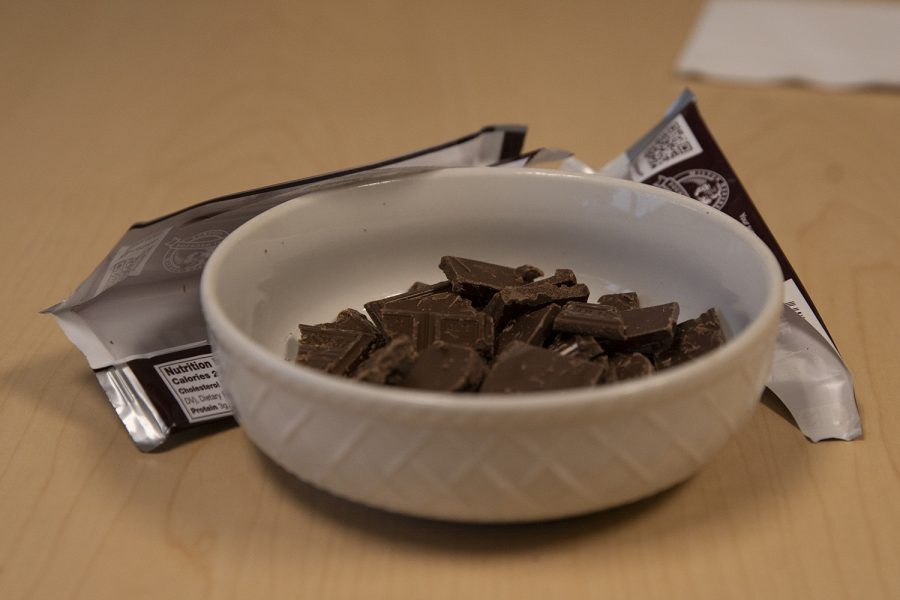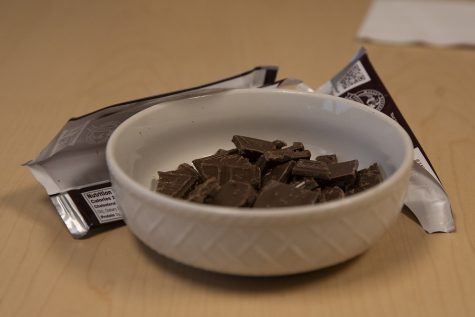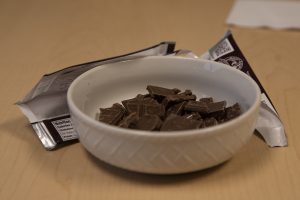UI scientists use chocolate, discover obesity can change perceptions of satisfaction in food
Through experimentation using chocolate, University of Iowa researchers have found that obesity may alter taste perception.
Photo Illustration by Tate Hildyard & Ryan Adams. (The Daily Iowan)
September 10, 2019
While many chocolate eaters may find the dessert wholly satisfying, there comes a point where their consumption may be too much. Now, researchers in nutrition-related fields are studying taste perception and when enough is enough.
A recent University of Iowa experiment focused on finding how much satisfaction participants received from eating a small piece of chocolate. Researchers aimed to demonstrate how the perception of taste changes as someone eats more food.
To map exactly when satisfaction began to decline, participants were asked how satisfying the chocolate was after each additional piece they were fed.
Linnea Polgreen, UI associate professor in the Department of Pharmacy Practice and Science and co-author of the research, said the team hoped to explore the idea of applying economic concepts to solve problems in healthcare.
“As more of an item is consumed, the utility or satisfaction goes down,” Polgreen said in an email to The Daily Iowan. “We wanted to determine the extent to which this applied to food.”
Polgreen and three other UI researchers published this study in the Journal of the Academy of Nutrition and Dietetics, displaying that obesity may play an important role in how perception of taste changes during eating.
The results indicated that normal-weight and overweight participants did not see any significant differences in their taste perceptions. Obese participants responded with higher levels of initial taste perception, which declined at a more gradual rate than non obese participants in the study.
Past research indicated that obese individuals prefer the smell of chocolate more than those who are not obese, Polgreen said, but it is not yet clear if these differences in smell and taste perception are due to environmental factors, physiology, or genetics.
“This is an area for future research,” Polgreen said.
This report was the first time any of the authors had conducted experiments dealing with taste perception in this manner, Polgreen said.
“Before this study, most of our research involved the use of previously collected data,” Polgreen said. “Although many questions can be answered with previously collected data, many cannot.”
Student Wellness dietician JoAnn Daehler-Miller said she found the results of the experiment interesting.
“Things are kind of starting to fall in place [in understanding how the brain reacts to food],” Daehler-Miller said.
RELATED: UI faculty promoting healthier habits to reduce Iowa’s high obesity rate
Daehler-Miller added that such work digs into whether overeating by heavier people is a result of learned behavior or physiological processes.
When Daehler-Miller meets with students to discuss nutrition concerns, she said they are examined to see if the biggest influencer is too much snacking, emotional eating, or portion control, to name a few.
Establishing good eating habits when first arriving on campus and eating in the dining halls can be a great first step for those concerned with overeating, Daehler-Miller said.
According to Daehler-Miller, this research is helpful to understand when approaching strategies to alter eating habits, and it may change perceptions of guilt and shame that sometimes come with eating-related stresses.
Katherine Mellen, an associate professor in the UI Department of Health and Human Physiology, said it is important to know whether the change in taste perception is a result of a change in the taste buds themselves.
“Avoiding multitasking while eating and being mindful of what we’re eating are easy steps to prevent overeating,” Mellen said.




















